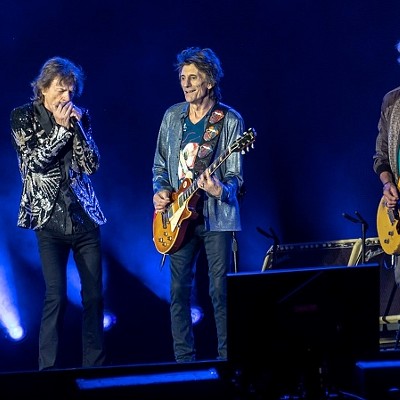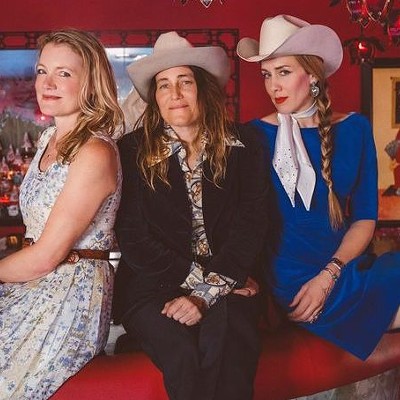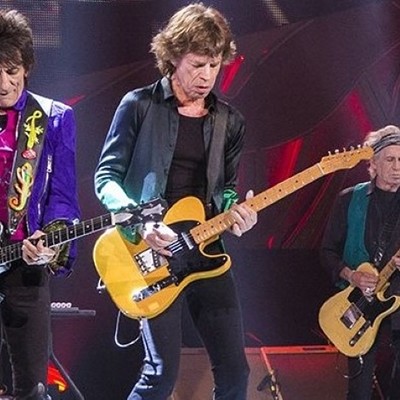 |
| Photo by David Hume Kennerly/White House Photograph Courtesy Gerald R. Ford Library |
| Preston, George Harrison and President Gerald Ford at the White House |
Preston, having been a highly regarded artist and sideman for years, was about to reach the peak of his post-Beatles fame. He was the only musician ever credited alongside the Fab Four (for helping to write their 1969 hit "Get Back"). Most historians also credit his boisterous personality and charm in the studio for keeping the band together a bit longer. The band even considered making him a permanent part of the lineup, hence the nickname "The Fifth Beatle." Sporting a giant afro wig, a sharp suit and his signature gap-toothed smile, he introduced himself to Moore.
"I thought he was just ridiculous-looking, but he was such a sweet guy," Moore remembers.
In 1988, Preston and Moore's third husband, Sam Moore, were booked together on tour throughout Italy. The trio drove around in a maroon, Volvo station wagon with broken air conditioning for a sweltering six weeks. Dirty jokes and salty language bounced around the car as they made their way through lush countryside. Moore still has grainy 8mm film of Preston riding horseback in the mountains between stops.
"It was like going to summer camp," Moore says. "Just one ridiculous adventure after the next."
Preston's sensitive honesty offstage belied his role as the masculine, organ-playing swami of soul, whose distended shrieking notes accompanied the Beatles on their final rooftop concert. On the outside, he was the charming prodigy who cut his teeth playing for Mahalia Jackson at age 10. He'd learned wild showmanship from Little Richard and perfected his art with Sam Cooke, Ray Charles, the Rolling Stones, Eric Clapton, Aretha Franklin and many others. But Preston opened up to Moore about his entire life story, including the tragic parts.
The star was the victim of molestation and sodomy as a child. After moving with his family to L.A. from Houston, his mother -- also a brilliant organ player -- performed in a touring production of Amos 'n' Andy. Preston was about nine years old when a piano player in the company began assaulting him. His mother refused to believe him, and it went on for an entire summer. He was also molested by a local preacher. It was devastating abuse that he would hide with smiles, but from which he would never fully recover.
Preston would become successful in spite of the trauma as a virtuosic, in-demand organ player with chart-topping albums and hit singles under his belt. In the early '70s, while he was engaged to model/actress Kathy Silva, he returned home one evening to find his fiancee in bed with his friend Sly Stone (whom Silva later famously married onstage at Madison Square Garden). That ended Preston's relationships with women, Moore says. He began smoking crack regularly and having sex with men.
"[Getting high] was the only way he could do it," Moore says. "And when his sexual urges came down on him, he couldn't bring himself to ever touch a woman again."
Preston didn't have long-term relationships, but his sexual orientation became widely known in the entertainment world. However, being an openly gay black man associated with the black church wasn't an option for him.
His career stalled in the '80s, lost in a haze of cocaine and alcohol. In 1991, he was arrested after a 16-year-old boy claimed Preston had shown him pornography and committed obscene acts with him. He was also accused of assault with a deadly weapon. His punishment was a procession of rehab, house arrest and probation. In 1997, he broke his parole by testing positive for cocaine, resulting in a three-year sentence. While in prison, authorities found that a team including his former manager had staged car crashes, burglaries and fires for insurance purposes. Preston declared bankruptcy twice around this time and was sentenced to another year in jail.
"When he got out, he didn't think he was going to be accepted," Moore says. "He thought he'd never work again."
Moore was the first person to offer Preston gigs after his prison stint. She became his manager when he toured with Eric Clapton in 2001. Though Preston was starting to break back into full-time show business, the troubled star was nearly derailed when he experienced renal/kidney failure twice while on tour that year and again in 2004. Both bouts nearly killed him. After that, Preston remained on dialysis until his death.
He moved to Scottsdale, Arizona, in September 2004 to live in an estate ten minutes from the Moores. Despite all of the drama in his life, Preston -- a cropped haircut in place of the 'fro -- still had some decent years of success touring in the mid-2000s. His potential income in 2006 was to be well more than $2 million, making him far from financially insolvent at the time of the bankruptcy.
In October 2005, Preston performed in LA at a DVD-release event for The Concert for Bangladesh, a 1972 film (and album) chronicling the awareness- and fundraising effort spearheaded by the late George Harrison. Sadly, another would-be bright spot in his career was marred by drug use. According to his personal assistant at the time, Preston wound up sneaking a bag of crack onto his flight -- risking even more prison time -- and then feigned sickness to get out of concert rehearsals so he could score more drugs.
"For him to have taken a baggie full of crack cocaine on a commercial airline, and then go out in a $100,000 car into the hood and get some more rock -- it had totally taken him," Moore says.
Story continues on the next page.






